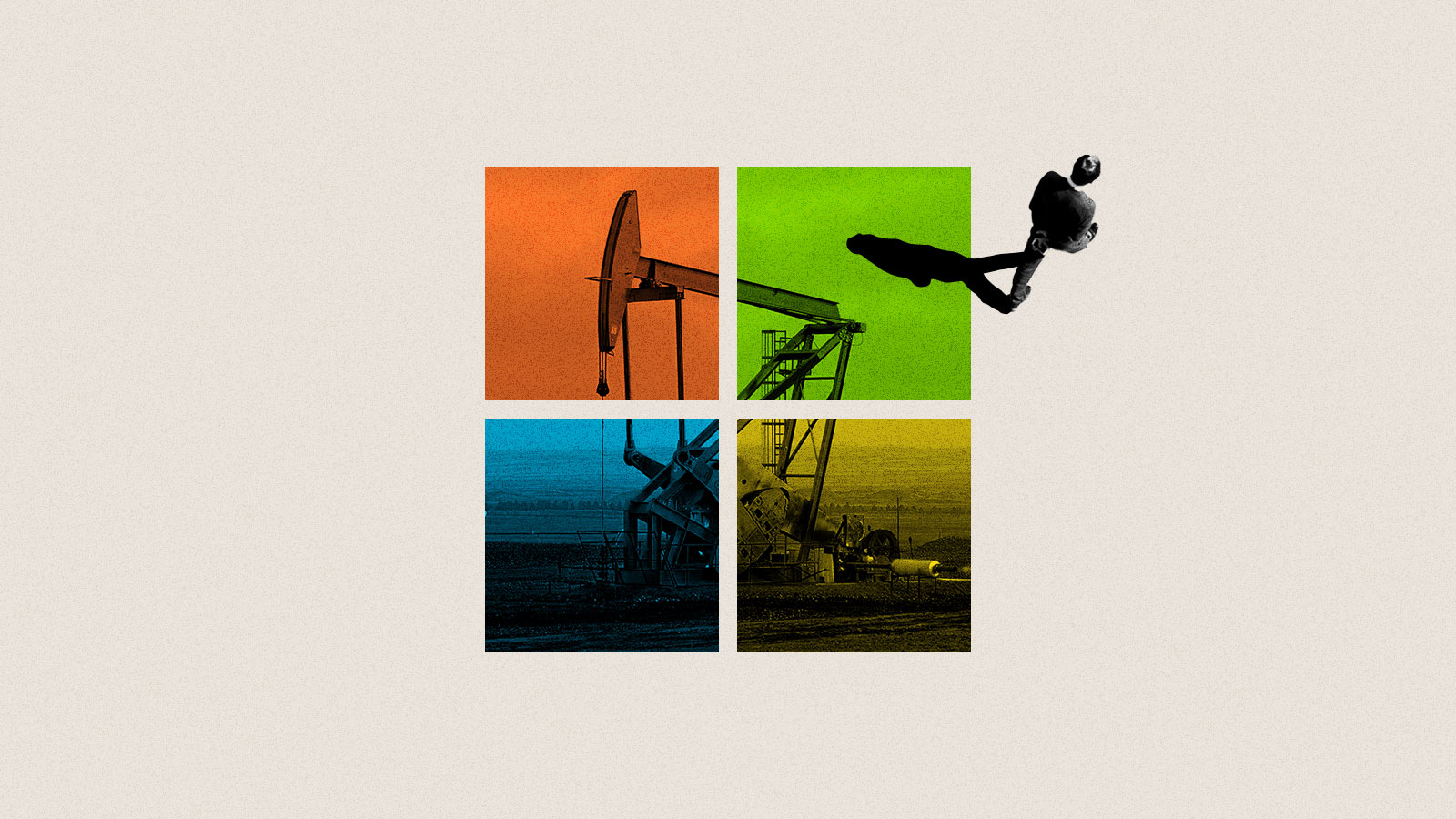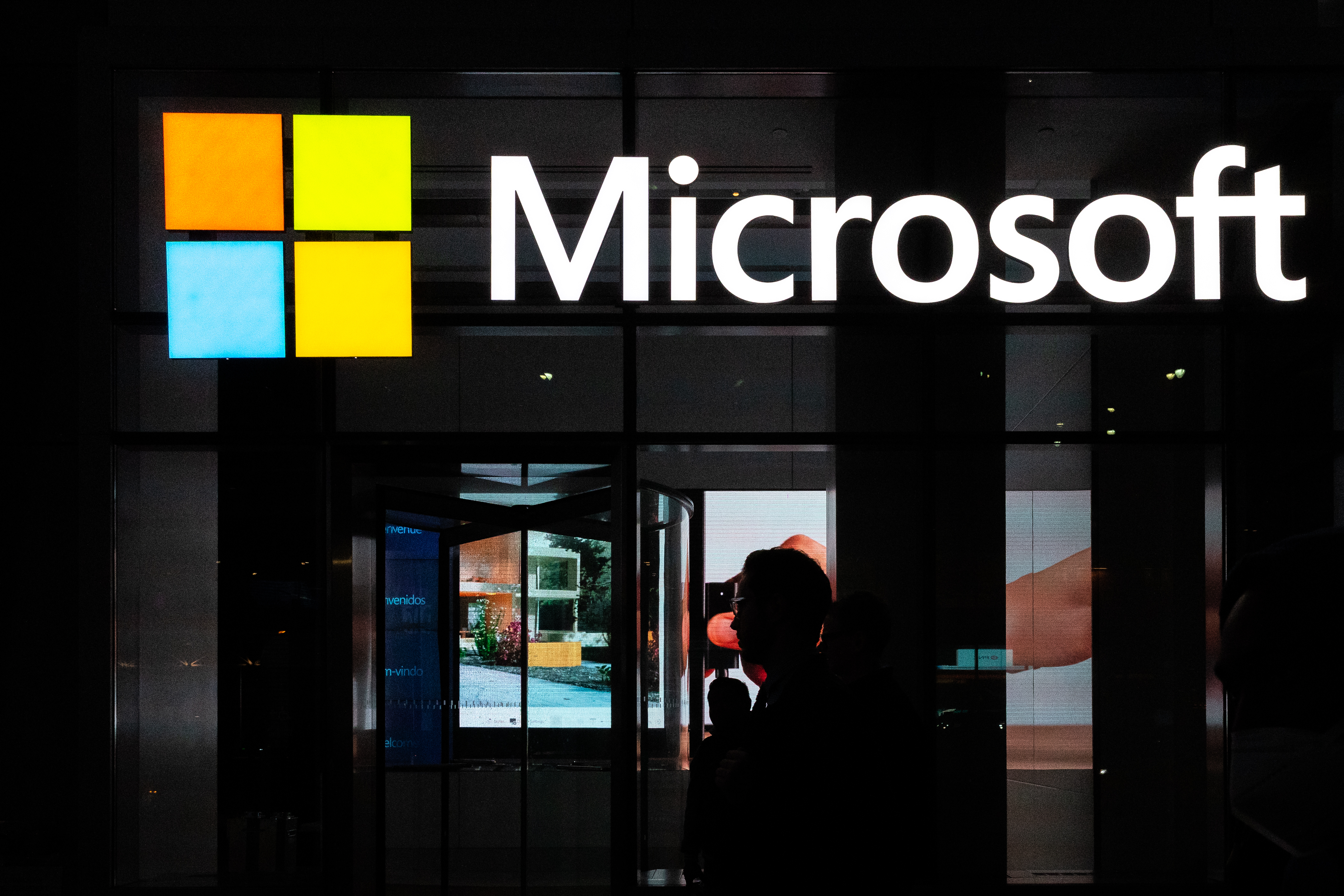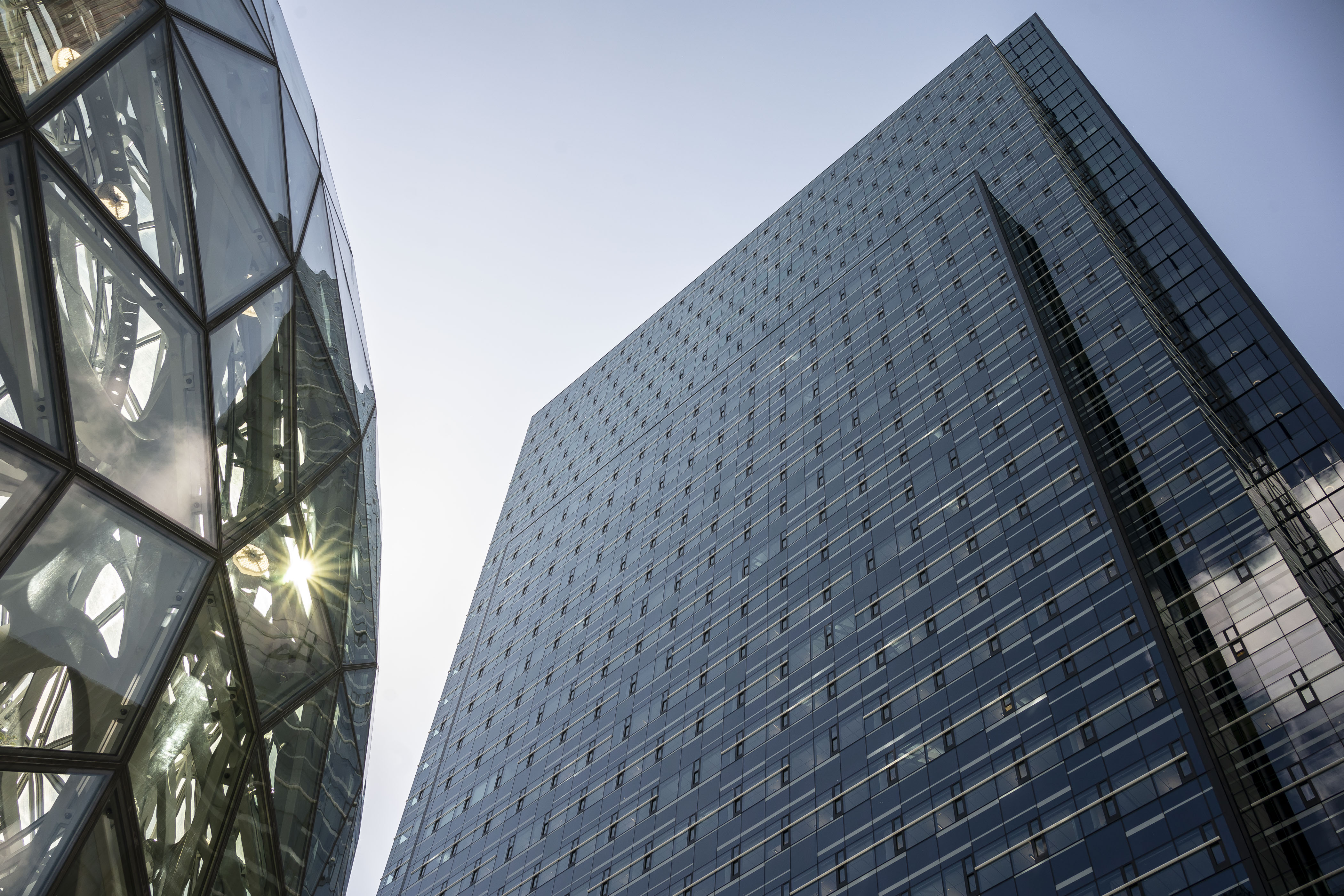For nearly a decade, Holly Alpine (née Beale) loved working at Microsoft. Shortly after finishing college, in July 2014, she landed a job there as a technical account manager. Less than four years later, Alpine was leading a program that invests in environmental projects in the communities where Microsoft’s data centers are located. She was also helping organize a worker-led sustainability group called the Sustainability Connected Community, which would grow to nearly 10,000 Microsoft employees worldwide by late 2023.
But at the end of last year, Alpine reached a painful decision: She could no longer ethically work at Microsoft. On January 24, 2024, Alpine sent an email to Microsoft president Brad Smith, CEO Satya Nadella, and several other senior company officials, letting them know why.
Writing on behalf of herself and a colleague who resigned at the same time, Alpine told the tech giant’s top brass that the two were quitting in “no small part” due to Microsoft’s work for the fossil fuel industry aimed at automating and accelerating oil extraction.
“This work to maximize oil production with our technology is negating all of our good work, extending the age of fossil fuels, and enabling untold emissions,” Alpine wrote in the email. “We are both deeply saddened to be so let down by a company we loved so much.” (Alpine’s colleague asked Grist not to identify them, citing concerns over how it might affect their future employment prospects in the tech industry.)
Alpine’s blunt resignation letter didn’t come out of nowhere. For years, she was one of the faces of an internal, employee-led effort to raise ethical concerns about Microsoft’s work helping oil and gas producers boost their profits by providing them with cloud computing resources and AI software tools. Former Microsoft employees and sources familiar with tech industry advocacy say that, broadly speaking, employee pressure has had an enormous impact on sustainability at Microsoft, encouraging it to announce industry-leading climate goals in 2020 and support key federal climate policies. But convincing the world’s most valuable company to forgo lucrative oil industry contracts proved far more difficult. Eventually, Alpine decided speaking up internally wasn’t enough.
This spring, Alpine spoke with Grist for her first on-the-record interview describing her experience advocating for change inside Microsoft. By speaking out publicly despite her concerns about legal risks, Alpine hopes to place additional pressure on her former employer to address the emissions it is enabling through technology partnerships with fossil fuel companies. Alpine’s account, along with those of other former Microsoft employees, as well as internal documents current and former employees shared with Grist, offer a rare glimpse into how tech industry workers are applying behind-the-scenes pressure to hold their bosses accountable on climate change.
“My resignation was driven in part by the realization that the tech industry, including Microsoft, is increasing the profitability and competitiveness of these fossil fuel giants and perpetuating their existence when they should be phased out,” Alpine told Grist. “It became apparent after years of internal efforts … that Microsoft was unwilling to enact meaningful change.”
A Microsoft spokesperson told Grist that the company’s employees are “core to our sustainability mission” and that executives engage with employee groups, like the Sustainability Connected Community that Alpine helped establish, “on a regular basis as part of an ongoing dialog.”
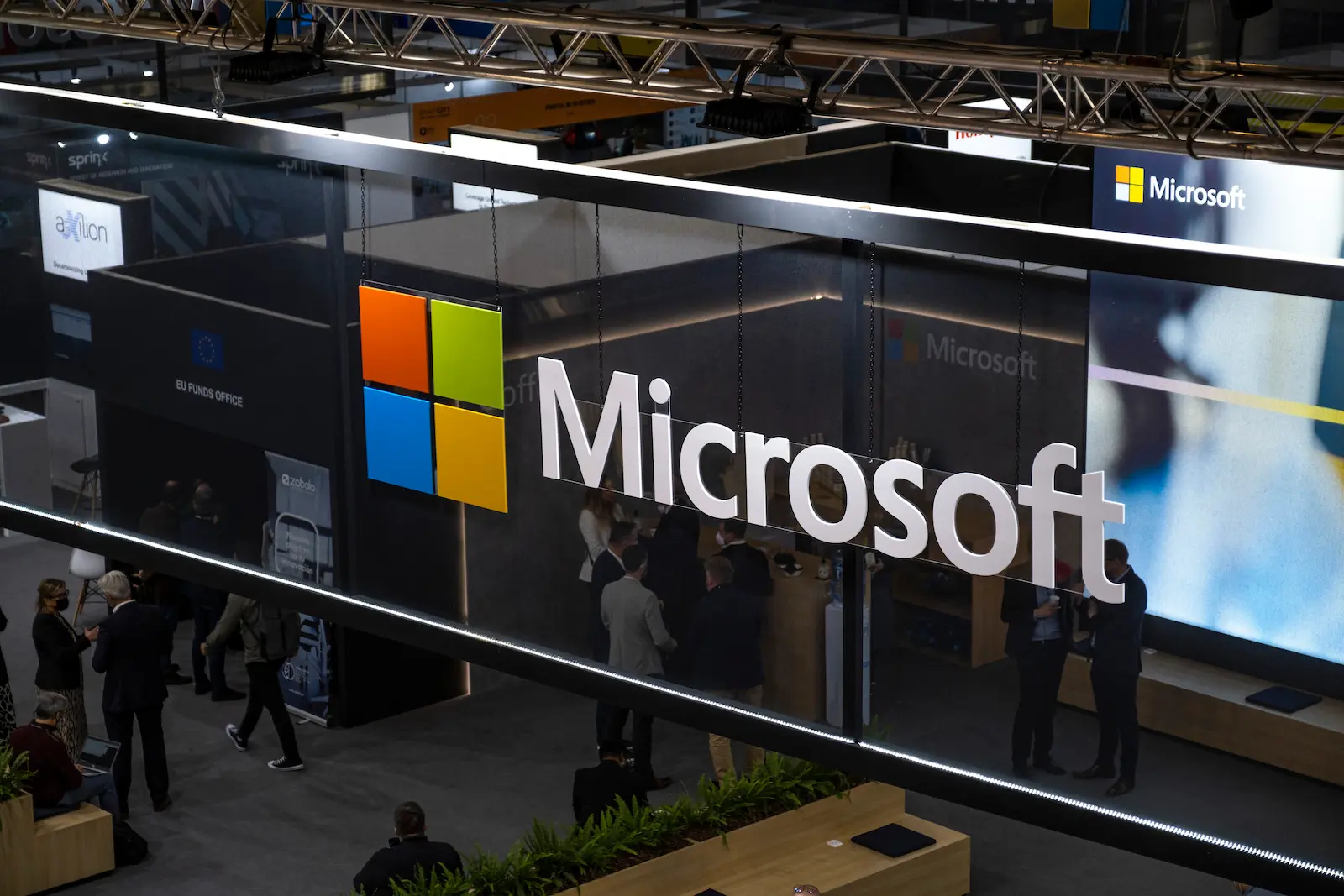
“The energy transition is complex and requires moving forward in a principled manner. We believe that technology has an important role to play in helping the industry decarbonize, and that requires balancing the energy needs and industry practices of today while inventing and deploying those of tomorrow,” the spokesperson added. “And we continually monitor our emissions, accelerate progress while increasing our use of clean energy to power data centers, purchasing renewable energy and other efforts to meet our sustainability goals of being carbon negative, water positive, and zero-waste by 2030.”
It’s true that Microsoft is taking numerous steps to address the sustainability of its own operations. But for years, the company has also furnished fossil fuel giants with cloud computing services and specialized software tools powered by machine learning and AI in order to streamline and automate their operations. These digital technologies help companies discover oil faster, squeeze more from existing wells, and boost productivity across their operations in order to stay cost competitive in an age of cheap renewable energy. The digital services market for oil and gas is “immense,” as a 2020 report by oil industry analysts at Barclays put it, with the potential to unlock $150 billion in yearly savings for producers.
Over the past seven years, Microsoft has announced dozens of new deals with oil and gas producers and oil field services companies, many explicitly aimed at unlocking new reserves, increasing production, and driving up oil industry profits.
In 2017, Alpine and former Microsoft employee Drew Wilkinson came together to organize a small group of workers who shared a passion for sustainability and wanted to make positive changes at Microsoft. In early 2018, that group was folded into the company’s formal Connected Communities program, which provides employees with support and resources to organize volunteer communities based on shared interests. The mission of the Sustainability Connected Community — to make sustainability part of everybody’s job at Microsoft — resonated with workers around the world, and the group quickly grew to several thousand members.
In the group’s first few years, tech companies’ oil and gas contracts became a focal point for climate-concerned workers across the tech industry. As they organized and began pressuring their bosses to take action on climate, news outlets started calling out Big Tech for creating AI technology aimed at accelerating oil production.
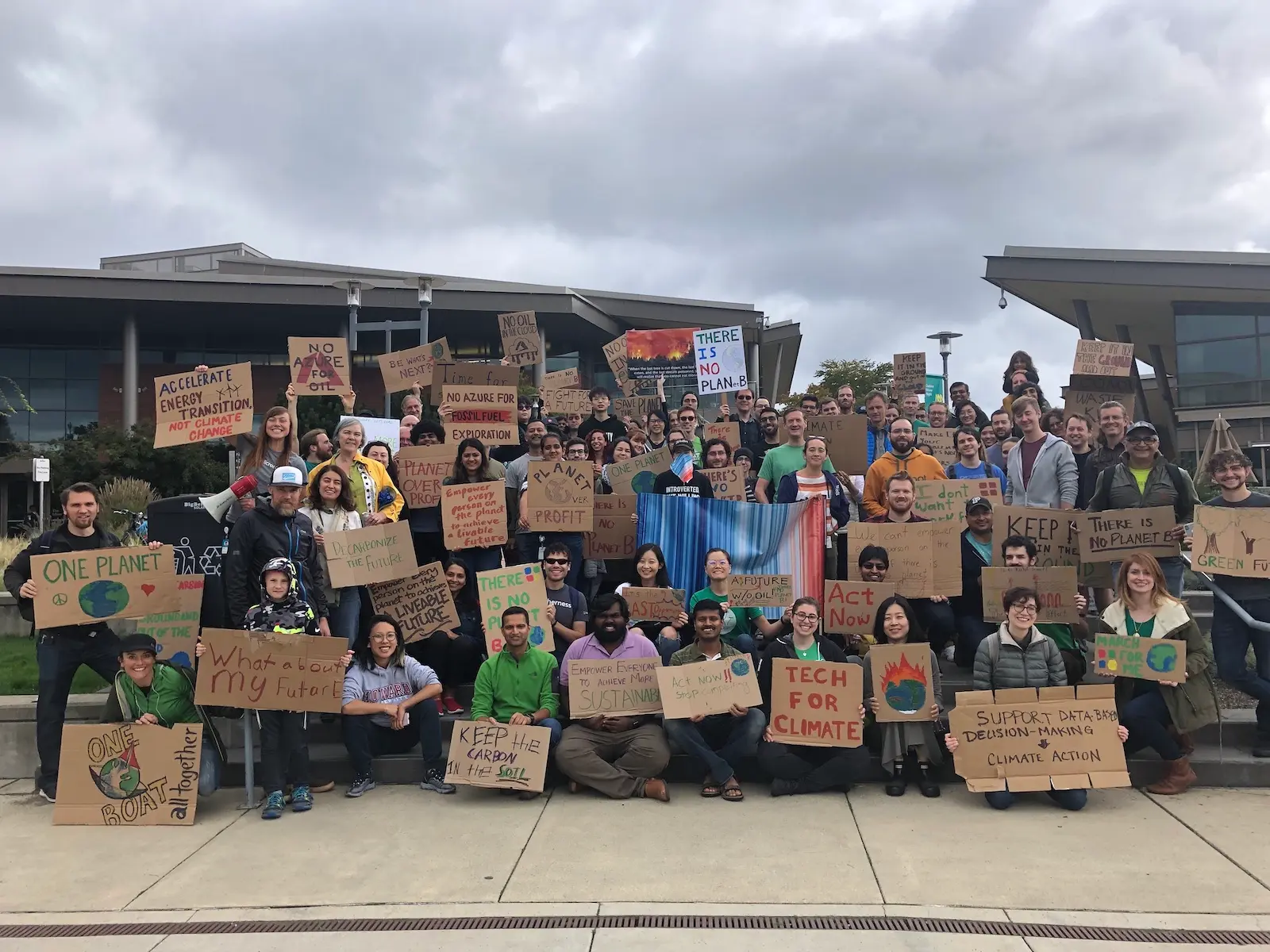
At an employee town hall in September 2019, a Microsoft worker asked Nadella, the company’s CEO, if he believed that helping oil companies extract more fossil fuels was an ethical use of the company’s technology. Nadella responded by stressing that fossil fuel companies are actively investing in the energy transition, according to a meeting transcript that was manually recorded by employees present at the time. Nadella’s response implied that by helping oil companies be more productive and achieve cost savings, Microsoft was enabling them to put more resources into emissions-reducing innovations.
“To me his answer was borderline gaslighting,” Wilkinson told Grist. “Those of us in the sustainability community were like, ‘The work you’re doing is not to help them transition. The work you’re doing is to help them find and extract and burn more oil.’”
As concerns over the company’s fossil fuel work mounted, Microsoft was gearing up to make a big sustainability announcement. In January 2020, the company pledged to become “carbon negative” by 2030, meaning that in 10 years, the tech giant would pull more carbon out of the air than it emitted on an annual basis. The news generated a wave of positive media attention and was met with cheers from the Sustainability Connected Community, Wilkinson said.
“The initial reaction was like, ‘Holy sh–t, this is awesome,’” Wilkinson told Grist. “All this pressure we put on the company” — not just around the oil contracts, but sustainability more broadly — “worked.”
The group’s concerns over Microsoft’s fossil fuel business “died down” for a while, according to Wilkinson: “Those of us who had been organizing on it back in 2019 were like, ‘Let’s wait and see what they do. Let’s give them a chance.’”
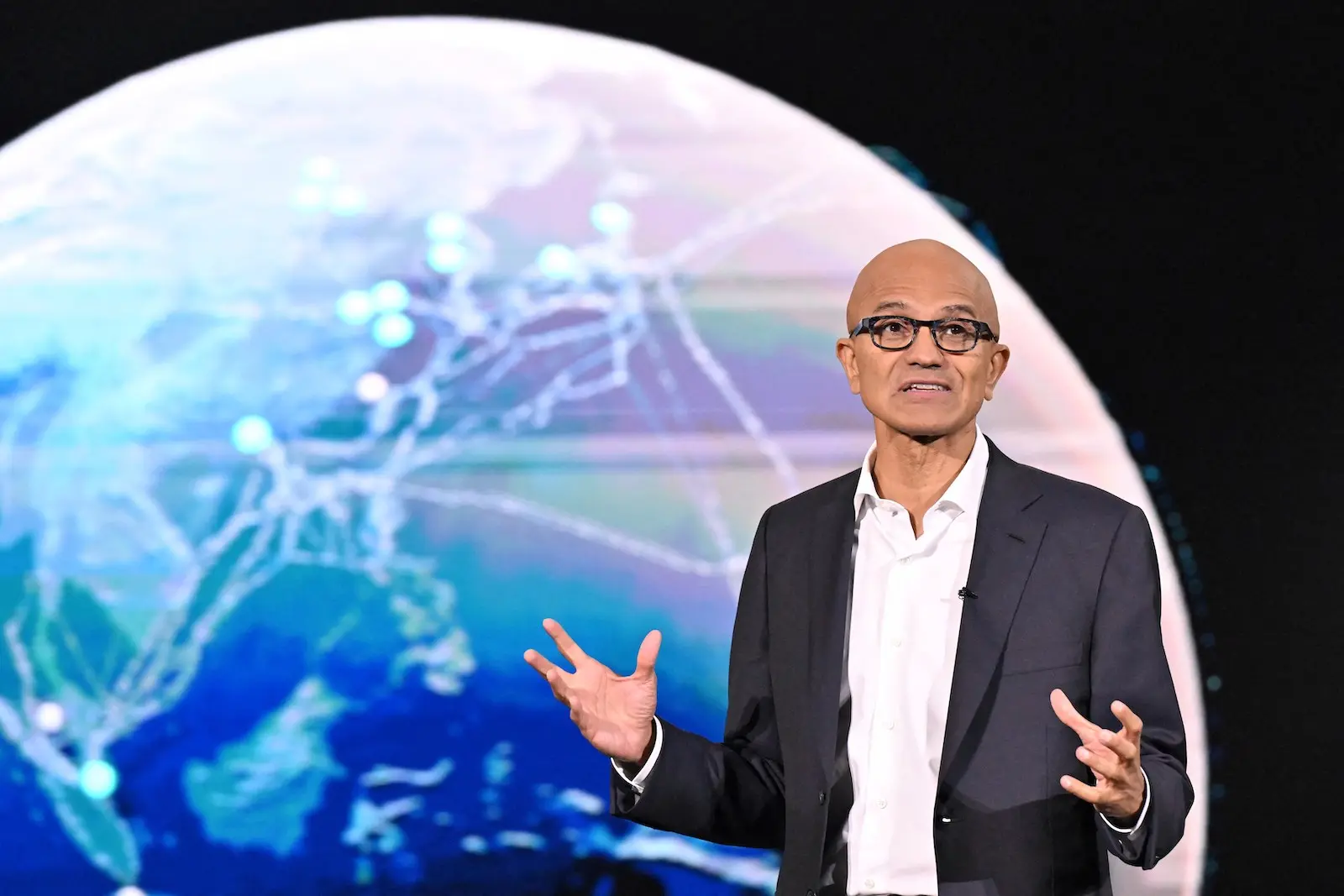
For nearly two years, employees watched and waited. Following its carbon negative announcement, Microsoft quickly expanded its internal carbon tax, which charges the company’s business groups a fee for the carbon they emit via electricity use, employee travel, and more. It also invested in new technologies like direct air capture and purchased carbon removal contracts from dozens of projects worldwide. But Microsoft’s work with the oil industry continued unabated, with the company announcing a slew of new partnerships in 2020 and 2021 aimed at cutting fossil fuel producers’ costs and boosting production.
For Alpine, Wilkinson, and other employees, the incongruity between Microsoft’s climate goals and its efforts to enable oil extraction was too big to ignore. In late 2021, a small group of employees involved in the Sustainability Connected Community came together to craft a memo for Microsoft’s leadership calling attention to the climate impact of the company’s fossil fuel business. By customizing its cloud computing technology for oil and gas companies, Microsoft was “enabling far more emissions than we offset or remove,” employees asserted — yet those indirect emissions were not included in the company’s internal carbon accounting. The employees calculated that a single deal with Exxon Mobil to expand production in Texas and New Mexico by up to 50,000 barrels per day could enable carbon emissions adding up to 640 percent of the company’s carbon removal target for 2021.
“We believe we must hold ourselves accountable for the enabled emissions of our technology,” reads the memo, a copy of which was shared with Grist. “Our principled approach and leadership can — and should — set an industry standard.”
The memo goes on to outline more than a dozen recommendations for the company, including advocating for policies that align with 1.5 degrees Celsius (2.7 degrees Fahrenheit) of warming, measuring the emissions increases (or reductions) enabled by Microsoft’s technology, and ceasing to develop custom software tools aimed at increasing oil extraction.
In December 2021, Alpine, along with two other employees who asked Grist not to identify them, held a meeting with Smith and Lucas Joppa, who was then Microsoft’s chief environmental officer, to discuss the memo and present their recommendations. The meeting felt “really positive,” Alpine told Grist, adding that Smith expressed agreement with most of the employees’ recommendations and even appeared surprised that one of them — adding environmental impacts to Microsoft’s internal principles governing the responsible use of AI — hadn’t already been implemented. Smith, Alpine said, even offered to assemble a small team to further explore the concept of environmentally responsible AI principles. A former Microsoft employee familiar with the company’s responsible AI standards told Grist the idea was investigated but never went anywhere; the company’s responsible AI principles still do not include sustainability.
Microsoft and Joppa declined to comment on the meeting.

Alpine told Grist she left the meeting “hopeful that things would change.” And several months later, in March 2022, Microsoft issued a blog post outlining a series of principles that would guide its future work with the energy industry. The so-called energy principles included expanding work on initiatives focused on low and zero-carbon energy and helping energy customers develop “effective net-zero commitments.” Perhaps most significantly, the principles stated that Microsoft would only develop specialized tools for oil and gas extraction for companies that had agreed to reach net-zero emissions by 2050 or sooner.
“We were really excited when [the principles] were first published,” Alpine told Grist. “They were published, we were told, in part because of our advocacy, which felt really good.”
But the more Alpine and others asked questions about the principles, the more they felt let down. Microsoft’s pledge to only develop custom fossil fuel extraction technologies for companies with a net-zero target only covered the emissions associated with producing the fuels, known as Scope 1 and Scope 2 emissions. Oil and gas companies weren’t being asked to zero out the emissions associated with burning fossil fuels, known as Scope 3 emissions, which can represent upwards of 85 percent of their total emissions.
What’s more, oil companies simply had to put forth a net-zero target. Microsoft wasn’t requiring them to do anything to show they were on track to meet it.
“Requiring a net-zero target only for Scope 1 and 2 emissions brushes aside the vast majority of the problem, which is the emissions that result from burning the fossil fuel companies’ products,” said Bill Weihl, founder of the nonprofit advocacy group ClimateVoice and a former sustainability director at Facebook and Google. “And a 2050 target, with no intermediate targets that would demonstrate a real commitment to shifting toward clean energy, is essentially meaningless.” Microsoft declined to comment on these concerns.
In November 2022, the Sustainability Connected Community held a call with Darryl Willis, Microsoft’s corporate vice president of energy, to discuss the principles. According to a meeting transcript generated by Microsoft Teams, employees peppered Willis with questions about what the principles meant and how Microsoft was implementing them, including which standards Microsoft would use to judge energy companies’ net-zero pledges, whether Microsoft was bringing up Scope 3 emissions in conversations with energy industry clients, and whether Microsoft had a plan to transition its energy division revenue away from fossil fuels.
Willis acknowledged that there was “a lack of standards” around Microsoft’s net-zero requirement, and that including emissions from the burning of fossil fuels in companies’ net-zero targets was “going to be a journey.”
“It’s hard, it’s big, it’s complicated,” Willis told employees on the call, according to the transcript. “But I think it’s not unrecognized as a necessity.”
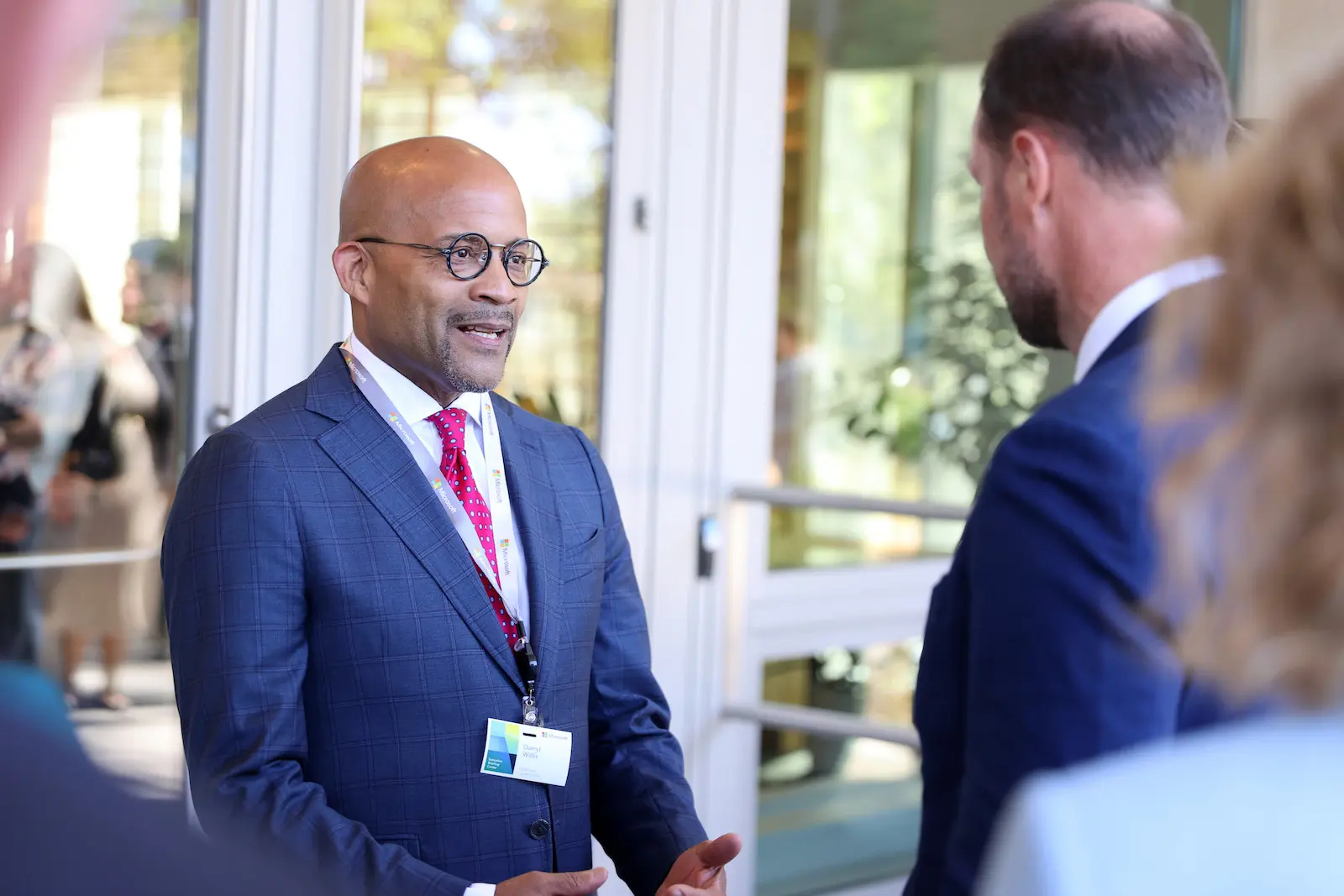
On the call, Willis committed to providing employees with updates on net-zero requirements as Microsoft continued to implement the principles. He also committed to providing a breakdown of the energy division’s revenue across six different sectors, from oil and gas extraction to low- or zero-carbon energy, as well as an analysis of personnel resources assigned to extractive industries versus renewable energy. Finally, Willis agreed to share a plan for how Microsoft’s energy division would transition its revenue toward low-carbon energy.
Alpine says she held several additional meetings with senior energy division and sustainability officials at Microsoft over the following year, and that Willis joined the Sustainability Connected Community for another call in November 2023. But the promised updates and analyses never materialized. At a December 2023 meeting with energy executives, Alpine says she was told that Microsoft was not responsible for defining net-zero for their customers, as there’s no global standard. (Microsoft declined to share any additional information with Grist concerning its net-zero standards for energy sector clients or any of the other commitments Willis made to employees in 2022.)
A few weeks later, Alpine came across a LinkedIn blog post Microsoft technical architect Azam Zaidi had written in April 2023 about the company’s work on oil and gas industry automation. Microsoft’s cloud services division, Azure, Zaidi asserted, was “at the heart” of the fossil fuel industry’s digital transformation,“enabling faster and more accurate decision-making and unlocking previously inaccessible reserves.”
“With Azure,” Zaidi concluded, “the future of oil and gas exploration and production is brighter than ever.”
“That was really a nail in the coffin for me,” Alpine said.
In her January resignation email to Smith, Alpine quoted Zaidi’s post directly. “Facilitating a ‘future of oil and gas’ that ‘is brighter than ever’ goes against everything that we stand for, and everything we thought this company stands for as well,” Alpine wrote.
Melanie Nakagawa, Microsoft’s chief sustainability officer, responded to Alpine the next day, thanking her for her “continued advocacy for sustainability.” Microsoft, Nakagawa wrote, is continuing to “uphold and adhere” to the energy principles, which the Sustainability Connected Community “had a role in shaping.”

Weihl of ClimateVoice says it’s important to recognize that Microsoft employees “have been very effective internally on several fronts,” including encouraging the company to publicly voice its support for the 2022 Inflation Reduction Act, which earmarked hundreds of billions of federal dollars toward clean energy. Last fall, Weihl said, employees at Microsoft launched an internal campaign targeting the company’s membership in trade associations that oppose climate policy, like the U.S. Chamber of Commerce. Earlier this year Microsoft released an audit of its trade associations showing their alignment (or lack thereof) on climate policy, which Weihl called “a big step toward accountability.”
Wilkinson, who started his own climate consulting business after he was laid off from Microsoft in early 2023, has maintained contact with many former colleagues in the Sustainability Connected Community. When it comes to addressing the emissions Microsoft enables within the fossil fuel industry, “the work is continuing,” he said.
Alpine isn’t sure what’s next for her career-wise, but she’s considering focusing on coalition-building around the emissions that tech corporations enable, or sustainable food production. In the meantime, she’s keeping the heat on Microsoft by speaking out publicly about her time there.
Weihl is optimistic about what Microsoft employees — and former employees — can do if they continue to raise a ruckus.
“The energy principles open a door,” he said. “So do the commitments Willis made. Employee pressure made that happen. It’s now up to employees … to keep the pressure on and make sure those principles and those commitments aren’t just window dressing.”
Correction: This story originally misidentified the structure of Holly Alpine’s work leading a program that invests in environmental projects in the communities where Microsoft’s data centers are located.

